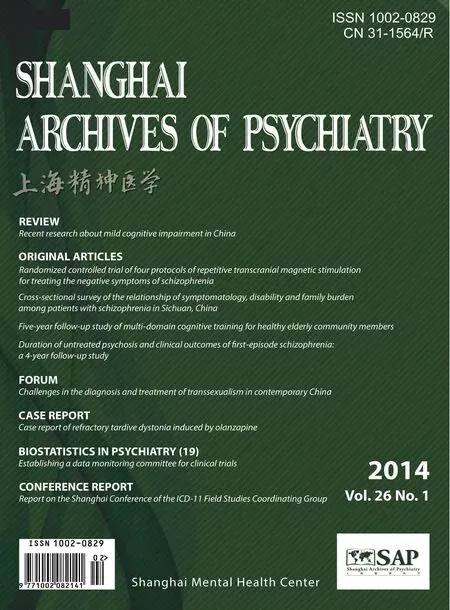Challenges in the diagnosis and treatment of transsexualism in contemporary China
Na LIU, Zheng LU,2*
?Forum?
Challenges in the diagnosis and treatment of transsexualism in contemporary China
Na LIU1, Zheng LU1,2*
According to the International Classif i cation of Diseases 10thEdition (ICD-10),[1]transsexualism refers to the condition where an individual desires to live and to be accepted as someone of the gender which is opposite their biological sex. It is usually accompanied with discomfort or distress about their anatomic sex. In some cases, individuals with this condition modify their body features using laser or plastic surgeries to resemble the physical characteristics of their preferred gender.To meet the diagnostic criteria for transsexualism the condition should: (a) have lasted for at least two years; (b) not be due to other mental disorders, (e.g.,schizophrenia); and (c) occur in an individual who is not intersexual and does not have other genetic mutations or chromosomal changes. Based on data from other countries, the reported prevalence of transsexualism is 1 to 2 per 100,000 people and the male to female ratio is 3:1.[2]Due to high levels of stigma against this condition, prior to the 1990s very few individuals in China had sought treatment for transsexualism. More recently there has been a dramatic change in the situation. Over 100,000 individuals have requested sex change operations and more than 1000 have completed sex reassignment surgeries.[3]For individuals with the condition, sex reassignment surgery can significantly improve their quality of life. However, the surgery is invasive and irreversible. Sex organ transplantation– which does not give the individual the capacity to function reproductively – usually requires the subsequent long-term use of immunosuppressants,which can adversely affect quality of life.[4]And the concomitant long-term use of external sex hormones is associated with serious side effects including high blood viscosity, elevated levels of blood lipids, weight gain, diabetes, prolactinemia, cholelithiasis, and liver tumors. Given the high prevalence of certain personality traits among these individuals and the unique challenges of the surgery and of the long-term followup of the surgery, serious psychological problems may occur if pre-surgery preparation is insufficient. Some individuals who have the operation are not able to transition to post-operation life smoothly because the new challenges exacerbate pre-existing psychological problems.[5]
In this context, standardization of diagnosis and treatment procedures is key to helping individuals with transsexualism adjust to their life. Currently, the diagnostic process used in China includes the following steps. (a) A psychiatrist conducts a preliminary interview with patients and their family members to gather basic information about the gender identity disorder and gender orientation of the individual, to ensure that the symptoms are not the result of any other mental disorder, to assess the current life circumstances and social network of the patient, and to determine the attitude of the family members towards the condition.(b) Examination by gynecological, urological and genetic specialists to conf i rm the biological sex of the individual and to evaluate the functioning of the sexual physiology.(c) Administration of detailed psychological tests to assess intelligence, personality traits, temperament,and knowledge and attitudes about gender preference,gender identity, sexuality, and general health. (d)Administer a formal structured psychiatric diagnostic exam to evaluate the patient’s current mental status and history of mental disorders. (e) Hold a private interview with the patient to obtain a detailed history of the development of sexual identity, the onset and course of gender-related distress, and the social adaptation (if any) of the individual and the family to this situation. (f) Team meeting of the psychiatrist(s)and other clinicians to discuss all the results and arrive at a consensus diagnosis and treatment plan. (g) Hold a meeting with the patient and family members to discuss the results of the evaluation and, if transsexualism is the final diagnosis, to assess their attitudes about sex reassignment surgery. (h) If the individual and family opt for surgery, a detailed discussion with the patient explores their expectations about the surgery and clarifies the limitations and potential long-term problems that are associated with the surgery.
To be eligible for surgery the following criteria need to be met:[6]
? the desire to become a member of the opposite sex has persisted for at least two years;
? the diagnosis of transsexualism is confirmed by a clinical psychiatrist who has specialized training in this area;
? the individual has received at least one year of psychoanalytically oriented psychotherapy;
? the individual has lived in society assuming the preferred gender for at least 18 months;
? the individual has received sex hormones under the supervision of a clinical psychologist or psychiatrist for at least 6 months;
? there is coordinated supervision of the entire pre-surgery evaluation process; and
? the individual and his or her co-resident family members (or guardians) provide written informed consent to the sex reassignment surgery.
Currently only a small number of advanced medical centers in China can conduct this detailed evaluation and perform the sex reassignment surgery. The total number of operations conducted at these centers is quite small.To meet the demand for these services, some small private plastic surgery facilities have started providing sex reassignment operations, but in most cases this is done without the comprehensive pre-surgery evaluation described above.[7]As might be expected, in some cases this leads to both physical and psychological problems after the surgery. These problems include insufficient or no involvement of psychiatrists or family members in the process, inadequate duration of sex hormone therapy or role adjustment in the community prior to the surgery, and failure to provide information about the possible problems with the surgery and about the physical or psychological problems after the surgery.
In order to prevent these types of problems,several countries have established ‘gender treatment centers’ that specialize in the evaluation and diagnosis of transsexualism and in the provision of hormone therapy and psychological therapy. These centers work closely with surgeons to improve the outcomes of sex reassignment surgery. This collaborative approach enhances the accuracy of the diagnosis and the standardization of treatment procedures which reduces the psychological trauma associated with the surgery.Chinese psychiatrists and other health professionals have only relatively recently recognized transsexualism as a medical condition that requires treatment. So it is not surprising that China has not yet fully implemented the standardized, comprehensive approach to the diagnosis and treatment of transsexualism that exists in several high-income countries. But as the number of patients and families willing to seek treatment for this condition in China increases, it is important for China to learn from other countries and to develop a network of specialized centers that standardize the assessment,treatment and long-term follow-up of these individuals.This would greatly improve the social integration and quality of life of the many individuals who are suffering from this distressing condition.
Conflict of interest
The authors declare no conflict of interest related to this manuscript.
1. World Health Organization. International Statistical Classif i cation of Diseases and Related Health Problems, 10thed. Geneva: World Health Organization; 1992
2. Gallarda T, Amado I, Coussinoux S, Poirier MF, Cordier B,et al. [The transsexualism syndrome: clinical aspects and therapeutic prospects]. Encephale. 1997;23(5): 321-326.French
3. Fu DL, He M. [Ethical problems of sex-change surgery]. Zhong Guo Yi Xue Lun Li Xue. 2002;16(3): 20-22. Chinese. doi:http://dx.doi.org/10.3969/j.issn.1001-8565.2002.03.010
4. Lu Z. [Sexual Dysfunction and Psychological Disorders].Beijing: People’s Health Publishing House; 2012. p. 151-152. Chinese. doi: http://dx.doi.org/10.3760/cma.j.issn.1674-6554.2012.06.029
5. Chen FZ, Lu Z. [The development of diagnosis and treatment of sexual identity disorders]. Zhonghua Xing Wei Yi Xue Yu Nao Ke Xue Za Zhi. 2012;21(6): 569-571. Chinese.
6. Zhu H, Cai ZM. [Transsexualism and sex reassignment surgery]. Zhong Guo Mei Rong Yi Xue. 2004; 13(3): 331-336.Chinese
7. Ke QT. [Conflict of cross-gender discourse and individual experience]. In: Fang G, editor. Xing Bie Duo Yuan: Li Lun Yu Shi Wu Yan Jiu. Taiwan: Wan You Press; 2012. p.138-146.Chinese
http://dx.doi.org/10.3969/j.issn.1002-0829.2014.01.007
1Shanghai Mental Health Center, Shanghai Jiao Tong University School of Medicine, Shanghai, China2Department of Psychiatry, Tongji University, Tongji Hospital, Shanghai, China
*correspondence: luzheng@#edu.cn
A full-text Chinese translation will be available at www.saponline.org from April 15, 2014.
(received: 2014-01-16; accepted: 2014-01-23)

Dr. Na Liu graduated in 2007 from Tongji University School of Medicine with a master’s degree in Psychiatry. Her advisor was Professor Zheng Lu. Dr. Liu has been working at the Shanghai Mental Health Center since graduation. She is currently working as an attending psychiatrist in a general psychiatry ward of the Shanghai Mental Health Center. Her research interests are schizophrenia and gender identity disorders.
- 上海精神醫(yī)學(xué)的其它文章
- Establishing a data monitoring committee for clinical trials
- Case report of refractory tardive dystonia induced by olanzapine
- Duration of untreated psychosis and clinical outcomes of firstepisode schizophrenia: a 4-year follow-up study
- Five-year follow-up study of multi-domain cognitive training for healthy elderly community members
- Cross-sectional survey of the relationship of symptomatology,disability and family burden among patients with schizophrenia in Sichuan, China
- Randomized controlled trial of four protocols of repetitive transcranial magnetic stimulation for treating the negative symptoms of schizophrenia

